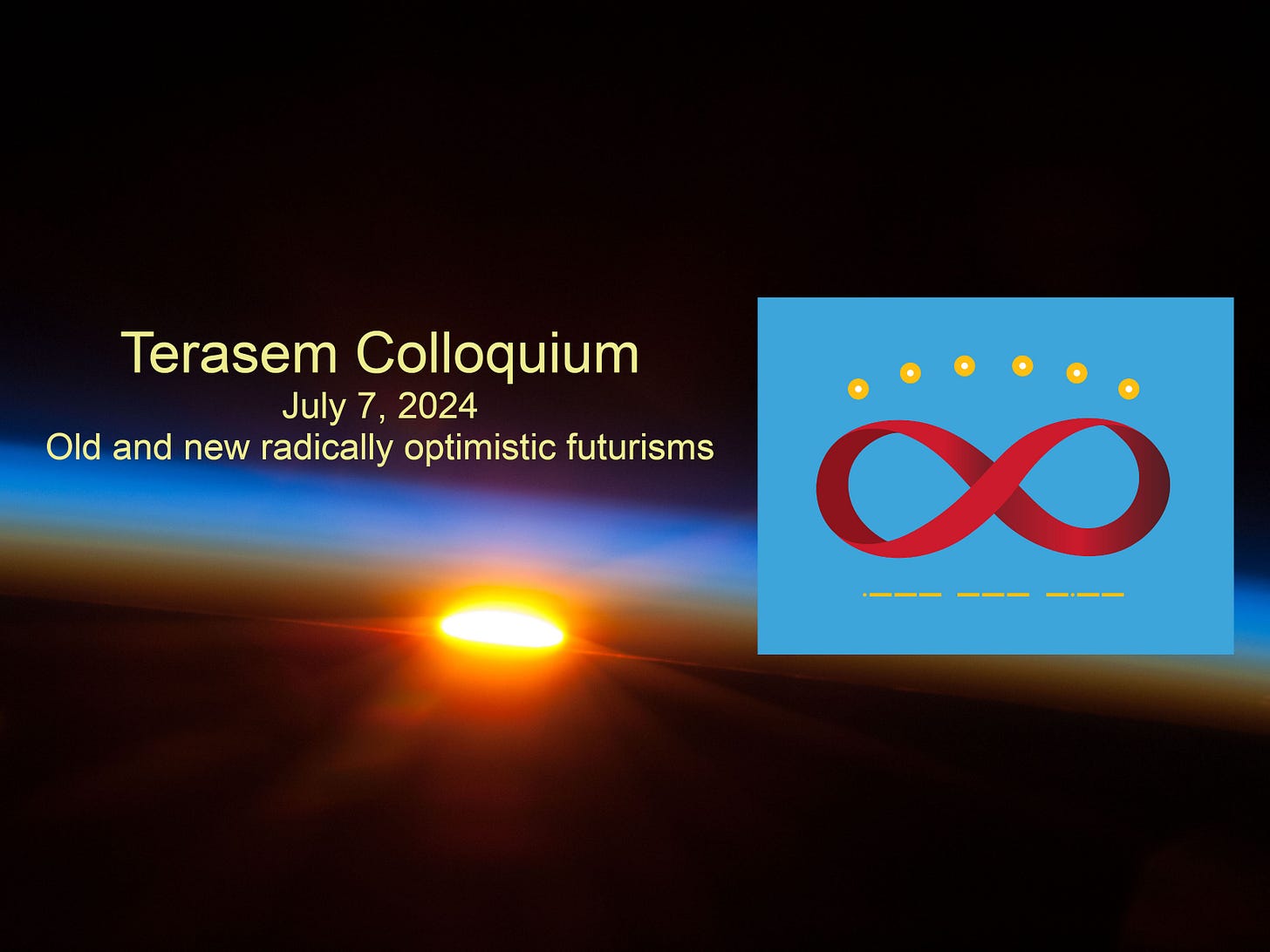And the moon be still as bright
Talks on futurist philosophies, AI, space.
I’m saving writing energy for the ongoing revision of my book draft, but I’m co-organizing and participating in podcasts and online events.
Mark your calendar! The Terasem Space Day Colloquium of 2024 will be held on July 7, via Zoom, from 10am ET to 1pm ET. The usual date of July 20 (anniversary of the Apollo 11 landing on the Moon) has been changed to avoid conflicts with another event. This Terasem Colloquium will explore old and new radically optimistic futurisms including Italian futurism, Russian and modern cosmism, extropy, and e/acc (the new kid on the futurist block).
Last week I had a long chat (in Italian) with David Orban. We discussed futurist philosophies (Italian futurism, Russian and modern cosmism, extropy, and e/acc (the new kid on the futurist block), current development in Artificial Intelligence (AI) and spaceflight, the inevitable political aspects of these things, and the long-term future of humanity & our AI mind children in the context of cosmic evolution.
The video of the chat is on YouTube. David has provided an edited transcript and an English translation of the edited transcript.

The picture above appears on the cover of “Still As Bright: An Illuminating History of the Moon, from Antiquity to Tomorrow” (2024), by Christopher Cokinos.
Yesterday I participated as a panelist in a webinar on “Still As Bright” with speakers Christopher Cokinos and Francis French, organized by the Cultural Considerations Working Group of the Moon Village Association (MVA). Chris presented the book, and Francis told stories of Apollo astronauts.
The title of the book is taken from a poem by Byron, which also appears in Ray Bradbury’s “The Martian Chronicles.”
Chris says:
“Still as Bright blends scientific, cultural and personal strands in an exploration of the Moon and its place in our lives and in mine. I come to know the Moon through my backyard telescope, traversing its wild and sublime surface while contemplating place, time, childhood, mortality - and the future of humans on the Moon. You'll meet forgotten selenographers, astronauts, scientists, artists and lunar bat-men (hint: they're not real). You'll witness a rocket launch, my failed attempt at an occult lunar ritual (a bit icky) and join me at the eyepiece of the 60-inch reflector at Mt. Wilson, California (like orbiting in a capsule).”
Last summer I participated in another MVA webinar where Chris gave a talk on “Awe is Not Enough: Contextualizing Astronomical Views through the History of the Sublime and Looking Toward Scientific Studies of Overview Effect(s).”
I’ve read “Still As Bright” and it has been great to read a book about spaceflight and the Moon written by a master of vivid, evocative language. We should have more of that.
I’m fascinated by the Moon because it is our first milestone and outpost on the long road to the stars. I can’t wait to watch the Moon knowing that people are living and working there. To me, this (and then Mars, and then the rest of the solar system, and then the stars) is more important than other things: I’m a spaceflight maximalist persuaded that advancing on the road to the stars is our cosmic duty, and our cosmic destiny awaits for us on the road to the stars.
Chris is fascinated by the Moon and spaceflight in a way that is more nuanced than mine and much more attentive to other concerns. He takes distance from terms like “colonization” or “conquest,” which I have no problem with because I want to advance on the road to the stars no matter how. But I welcome his approach, because it can reach people who wouldn’t like mine, especially young people. As a space maximalist, I think fostering public support for space expansion is more important than my own esthetic and philosophical preferences.
I said all these things. Chris replied that advancing toward a better society and expanding into space are not mutually exclusive goals, and we can and should pursue both. This is exactly what I wanted to hear.
Related: I’ve been invited to participate in a panelist in a presentation / discussion of “Reclaiming Space: Progressive and Multicultural Visions of Space Exploration” (2023), edited by James S.J. Schwartz, Linda Billings, and Erika Nesvold, which should take place sometime in June.
I was surprised to receive this invitation, because I’m not known as one who has too much patience for “wokeness” and I’m exactly one of those “male, white, politically libertarian, and nondisabled” space enthusiasts whose narrative has shaped spaceflight so far.
But again, as a space maximalist who understands the importance of cultural support for space expansion I totally welcome more inclusive narratives that can reach more people.
When the first black transgender astronauts will walk on the Moon or Mars, I’ll be among their first and most enthusiastic followers and admirers.



